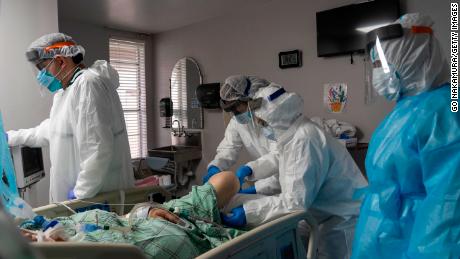(CNN)Children 5 and under should not be made to wear masks during the coronavirus pandemic, the World Health Organization and UNICEF said Monday.
Very young children are less susceptible to the virus and are less likely to spread it to others, the two United Nations agencies said in a joint statement.
"According to the limited available evidence, young children may have lower susceptibility to infection compared to adults, however available data suggests that this may vary by age among children," WHO and UNICEF said.
Additionally, some studies suggest that teens may play a more active role in transmission than younger children, the organizations say.
WHO has released new guidance divided by age groups:
CHILDREN UNDER 5 -- Should not wear masks for source control
"Based on the expert opinion gathered through online meetings and consultative processes, children aged up to five years should not wear masks for source control," the joint statement says.
The new guidance from WHO and UNICEF contradicts guidance currently in place from the US Centers for Disease Control and Prevention (CDC), which suggests children 2 and older should wear a mask.
CHILDREN 6 TO 11 -- Risk-based approach
For children between 6 and 11 years of age, WHO says a risk-based approach should be applied, taking into consideration local intensity of transmission; social and cultural environments; the child's capacity to comply; availability of appropriate adult supervision; potential impact of masks on learning and psychosocial development; and additional considerations such as disabilities or underlying diseases.
CHILDREN 12 AND OLDER -- Treat like adults
"Advice on mask use in children and adolescents 12 years or older should follow the WHO guidance for mask use in adults and/or the national mask guidelines for adults," the agencies said.
The guidance said no child should be denied access to education if a mask is unavailable.
"For children of any age with developmental disorders, disabilities or other specific health conditions that might interfere with mask wearing, the use of masks should not be mandatory and should be assessed on a case by case basis by the child's educator and/or medical provider," WHO and UNICEF added.
Get CNN Health's weekly newsletter
Sign up here to get The Results Are In with Dr. Sanjay Gupta every Tuesday from the CNN Health team.
Face shields are a possible substitute for masks, the groups added, althought hey are not as effective as masks.
And masks are not the only precaution kids should be taking. "It is important to emphasize that the use of masks is one tool and that children should also adhere to physical distancing, hand hygiene and respiratory etiquette," the new guidance says.






